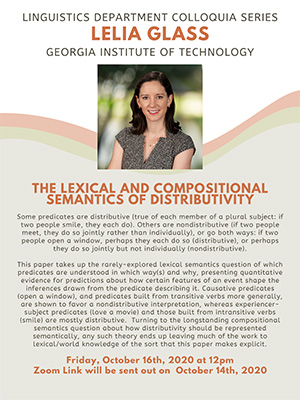The lexical and compositional semantics of distributivity
Lelia Glass
Georgia Tech
Friday, October 16, 2020
Noon
Zoom (email linguistics@rochester.edu for link)
Some predicates are distributive (true of each member of a plural subject: if two people smile, they each do). Others are nondistributive (if two people meet, they do so jointly rather than individually), or go both ways: if two people open a window, perhaps they each do so (distributive), or perhaps they do so jointly but not individually (nondistributive).
This paper takes up the rarely-explored lexical semantics question of which predicates are understood in which way(s) and why, presenting quantitative evidence for predictions about how certain features of an event shape the inferences drawn from the predicate describing it. Causative predicates (open a window), and predicates built from transitive verbs more generally, are shown to favor a nondistributive interpretation, whereas experiencer-subject predicates (love a movie) and those built from intransitive verbs (smile) are mostly distributive. Turning to the longstanding compositional semantics question about how distributivity should be represented semantically, any such theory ends up leaving much of the work to lexical/world knowledge of the sort that this paper makes explicit.

